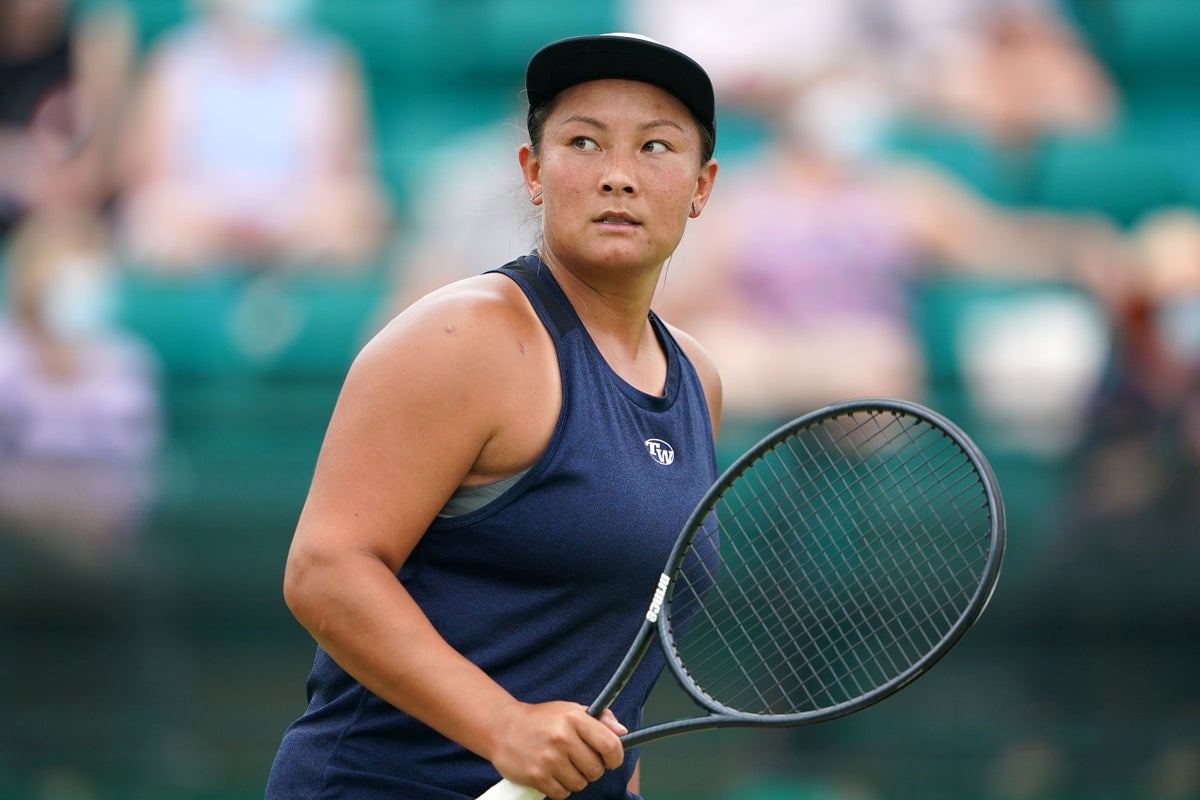
Support truly
independent journalism
Tears flowed as Tara Moore described the impact of the 19-month ban she served for a doping offence of which she was ultimately cleared.
The British doubles specialist was provisionally suspended in May 2022 after testing positive for the anabolic steroids boldenone and nandrolone at a tournament in Colombia.
Moore immediately protested her innocence but it was not until late December last year that an independent tribunal determined contaminated meat was the source of the prohibited substances and that she bore no fault or negligence.
Having been ranked 83rd in the world at the time of her failed test and Britain’s leading doubles player, Moore returned with no ranking and having spent more than £200,000 in trying to clear her name.
Moore’s Wimbledon comeback alongside Sarah Beth Grey ended swiftly in a 6-1 6-2 loss to third seeds Nicole Melichar-Martinez and Ellen Perez, but the result was not the source of the tears that followed.
“It’s been mixed emotions,” she said of her return to action. “There’s a lot of times where I’m completely elated and happy that I’m back and then there’s other times, even now I’m getting emotional about it, where I can’t believe it. It’s very difficult. It means so much to me.
“I was always hopeful that I’d be back. It took a really long time, a lot longer than I would have ever thought.
“It’s incredibly difficult coming back and reliving everything because every time you come on court you know how special it is because you’ve been taken out of the game not on your terms.
“Obviously I’m getting a lot older now and there’s a lot of things that I value a lot more. Time is precious.”
Moore was not the first player to fall foul of contaminated meat in South America but that did not stop the case dragging on even longer than that of Simona Halep, whose own high-profile provisional suspension overshadowed Moore’s.
And the process is not over yet for the 31-year-old, with the International Tennis Integrity Agency appealing against the nandrolone verdict.
“Don’t make me cry more,” she said with a rueful laugh when asked about the financial toll it has taken.
You're very guilty until you're proven innocent so you have to stand there and you're like, 'Ok, I know I'm innocent, I know that this is something I haven't done, how do I move forward from here'?
Moore, who spent all her savings on legal fees, has raised 12,000 US dollars (approximately £9,400) through crowdfunding, but she said: “It doesn’t touch the weight of it. It’s something that will be hanging over my head for a very long time.
“You’re very guilty until you’re proven innocent so you have to stand there and you’re like, ‘OK, I know I’m innocent, I know that this is something I haven’t done, how do I move forward from here?’
“It’s something that has been just awful. You find out who your true friends are and who your true supporters are. People did come around me and supported me and it was very heartwarming.
“A lot of times people (in tennis) are very removed from it, they don’t understand what it’s like. Even myself before all this happened, I had a very different picture of what it’s actually like. I wouldn’t wish it on my worst enemy.”
Players serving doping suspensions are not able even to enter official tennis facilities, so Moore, who lives in the United States, earned money by coaching beginners on public courts for up to 10 hours a day.
She kept her thoughts to herself regarding the anti-doping system, which has come in for widespread criticism, and said of her emotions: “I don’t think angry is the right word.
“Obviously over the past two years I’ve gone through an influx of emotions. Sometimes I’m upset, I was incredibly depressed for a very long time.
“As a tennis player, you start at a very young age, so it’s very much your identity. Trying to figure out who I am as a person outside of tennis, it’s been a very long road.”
One consequence is that Moore, now ranked down at 643 and unsure whether she will be able to afford to keep playing professional tennis, is anxious about everything she eats.
“I am just incredibly cautious with everything,” she said. “I was already a very cautious person before and you just never think that food’s going to do that to you. It’s completely changed me.”







